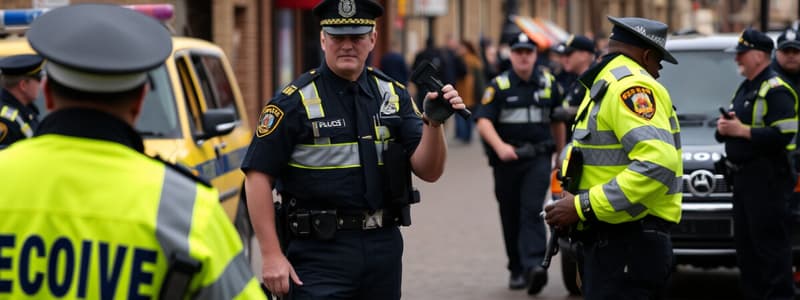Podcast
Questions and Answers
Who is known as the father of modern policing?
Who is known as the father of modern policing?
- Dr. Edmond Locard
- Eugene Francoisa Vidocq
- John Fielding
- Sir Robert Peel (correct)
What was the role of the Praetorian Guard in Rome?
What was the role of the Praetorian Guard in Rome?
- To protect the palace and the emperor (correct)
- To manage local law enforcement
- To oversee judicial power
- To serve as city firefighters
Which historical figure founded the Bow Street Runners?
Which historical figure founded the Bow Street Runners?
- Patrick Colquhoun
- John Fielding
- Henry Treblling (correct)
- Jonathan Wild
What method did Dr. Edmond Locard famously propose?
What method did Dr. Edmond Locard famously propose?
What was the main function of the Vigiles of Rome?
What was the main function of the Vigiles of Rome?
Which one of the following was a notable role of the Praefectus Urbi?
Which one of the following was a notable role of the Praefectus Urbi?
What is one reason the word 'vigilante' came into use?
What is one reason the word 'vigilante' came into use?
Who was known for recognizing criminals by the sound of their voices?
Who was known for recognizing criminals by the sound of their voices?
What year is associated with the founding of the first modern organized police force?
What year is associated with the founding of the first modern organized police force?
In the context of early policing, what does 'ten tithing' refer to?
In the context of early policing, what does 'ten tithing' refer to?
Flashcards are hidden until you start studying
Study Notes
Contingent DC (Athens)
- Keith magistrates were responsible for decision-making in care matters.
- Their actions were hindered, impacting local control.
Reign of Apped the Great
- Emphasized local control through preandge (power).
- Less organized efforts for national security.
Ten Tithing
- System of accountability; 100 individuals could manage crime in groups of 1.
- Origin of early English policing, tackling serious law violations.
Thriting
- Group formed of ten individuals, where one chief led.
- Each member took responsibility for the group's actions.
The Time of Christ (Rome)
- Praetorian Guard: First police officers responsible for palace and emperor protection.
- Praefectan Urbi: Tasked with city protection, held executive and judicial authority.
- Vigiles of Rome: Functioned as firefighters, highlighting early public safety roles.
Civil Police Force
- Origin of the word 'vigilante' linked to community protection efforts.
Historical Timeline
- BC: Before Christ; AD (Anno Domini) marks the era of Christ.
- 1285 AD: Introduction of the Winchester Statute.
- 1920s: Jonathan Wild recognized as London’s leading criminal investigator, famous for his methods in the 1720s.
- 1449: Henry Treblling established the Bow Street Runners, marking the first professional police force.
- John Fielding, Treblling's assistant, known for identifying 3,000 criminals by voice, despite being blind.
Notable Figures
- Eugene Francoisa Vidoca: Formed a squad of former convicts to assist Paris police.
- Dr. Edmond Locard: Published techniques for scientific criminal investigation; famously noted, "Every contact leaves a trace."
- Sir Robert Peel: Established the London Metropolitan Police Force (LMPF); considered the father of modern policing. Officers colloquially known as "Bobbies."
Legacy of Policing
- Patrick Colquhoun pioneered the marine police force in the 1800s, contributing to policing evolution.
Studying That Suits You
Use AI to generate personalized quizzes and flashcards to suit your learning preferences.




